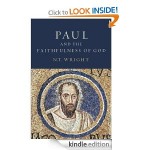Not many scholars or lay persons have swallowed the ouevre of Tom Wright whole. By this I do not mean that not many have bought his arguments, but rather that not many have read even all the seminal scholarly books he has written. I have read all the big ones (all the way back to the Climax of the Covenant and even before) and many of the littler more popular level books as well. Here I have to warn you that if you are planning to read Paul and the Faithfulness of God (2 volumes, 1700 and some pages), then to really get the most out of it, you will have needed to read the previous volumes in the NTPG series (The New Testament and the People of God volumes)– NTPG Vol. One, Jesus and the Victory of God, Resurrection and the Son of God, and now these Paul volumes. I say this because not only does Tom build on what he has said before, he presupposes it and counts on it at various points in these Paul volumes. Thus for example on p. 77 he says “In my minds eye I see the whole of NTPG Part III as though they were physically part of this book…and I encourage readers to do the same”, even though there is a twenty year hiatus between his discussion of the Pharisees in that first volume in the series, and the discussion here in the Paul volumes. Tom is not merely a global thinker, he is a longitudinal thinker and in most major things he has not changed his mind much in the last two decades and so he can say things like this and mean them. Not many persons, including not many scholars, have that degree of orderly sequential mental processes and convictions over such a long stretch of time.
Chapter Two also begins a series of chapters with birds in the title, first the birds of Isaiah 31.5, then the owl of Athena, then the eagle of Rome, and then some interesting bird poems by a poet he admires. At this point Tom is clearly playing with the house’s money in his scholarly career, as we Americans would say, and he is giving free reign to his fertile and creative imagination in his titles and turns of phrase. Let’s hope no one makes the crack that in the end these chapters are indeed for the birds, because in fact they are important and serious contributions to the discussion and the argument he is trying to make.
One more reminder. Tom has read a voluminous amount of material on the Biblical period and the Jewish, Greek, and Roman contexts, but he too stands on some shoulders of scholars who have gone before him. His ideas do not spring from his fertile imagination alone like Athena from the head of Zeus. Thus he relies on he epitomizers and says “Standing on the shoulders of text-reading giants, even if the giants were sometimes looking the wrong way, is better than crawling around on the floor.” (p. 78 n.5). Point taken, and I agree. Scholarship should not be seen as an exercise in creating a novum, something entirely new, when what truly matters is saying something true rather than merely saying something new. Only God is really capable of creatio ex nihilo. Doctoral students take note: It is difficult if not impossible to soar with the eagles if you only read and hang out with the turkeys!
Those who have read NTPG Vol. One will find the discussion of Saul the Pharisee in Chapter Two of the present volume familiar. Saul is characterized as a Shammai-ite Pharisee given to zeal of the sort we find with Phineas and the Maccabees, to wit he is prepared to persecute people when they violate Torah. Pharisees however were, as Tom admits, a divided lot– some following what more nearly could be called the peace party, namely the Hillel and Gamaliel line, but Saul seems to differ from his teacher on this score.
It is not however clear to me that Paul and the Maccabees could both be labeled Zealots in the later sense of the term applied to folk like Judas the Galilean and his descendents who fomented the Jewish war in due course. He is not a Zealot (with a capital Z) if by that one means those prepared to go to war against pagans when they violated Torah, Temple, or Territory, the three Ts of Judaism. I see no evidence that Saul the Pharisee was an advocate of the violent overthrow of the pagan overlords, but every evidence that he wanted to punish Jews who, in his view, violated their own laws, covenants, monotheism.
Zeal for Jews maintaining the Law is one thing, revolt against the pagans who were not, after all, obligated to keep the Jewish law, another, especially if they were leaving the Temple and its cultus alone (the triggering mistake Antiochus Epiphanes made).
And if indeed it is true Paul was a Roman citizen both before and after his conversion, there is no evidence he repudiated it. Indeed, there is evidence in a text like Rom. 13 that we would have opposed the violent overthrow of authorities he believed were only in power due to the God of the Bible. Here Chris Bryan’s book Render unto Caesar is helpful on this point. Long story short, I don’t think you can actually connect the dots between Saul the zealous defender of the Law, and Paul’s critique of the imperial cult, though it seems reasonably clear that he does critique that cult in his letters. He does so however not by advocating or practicing violence against said cult. He’s prepared to leave it to God to deal with those folk.














